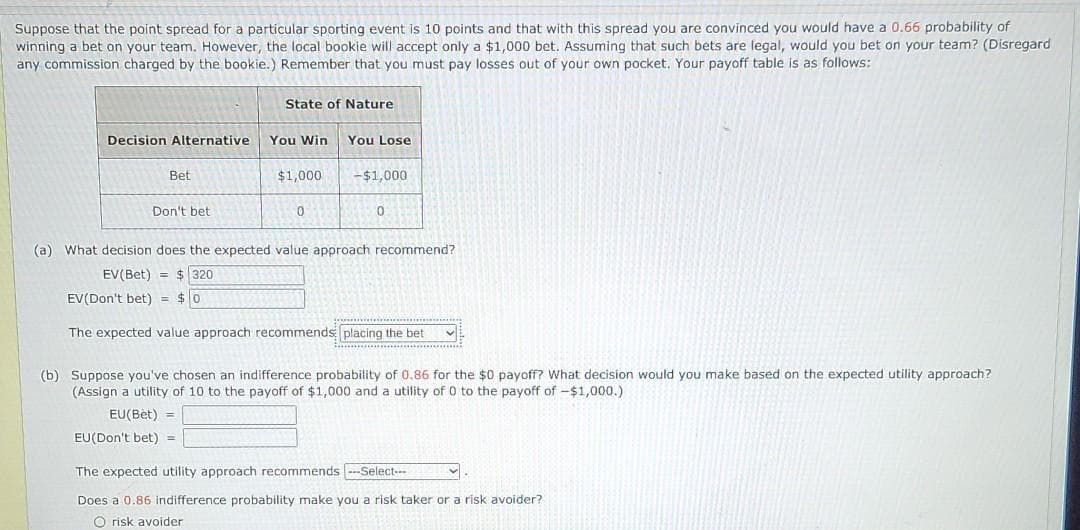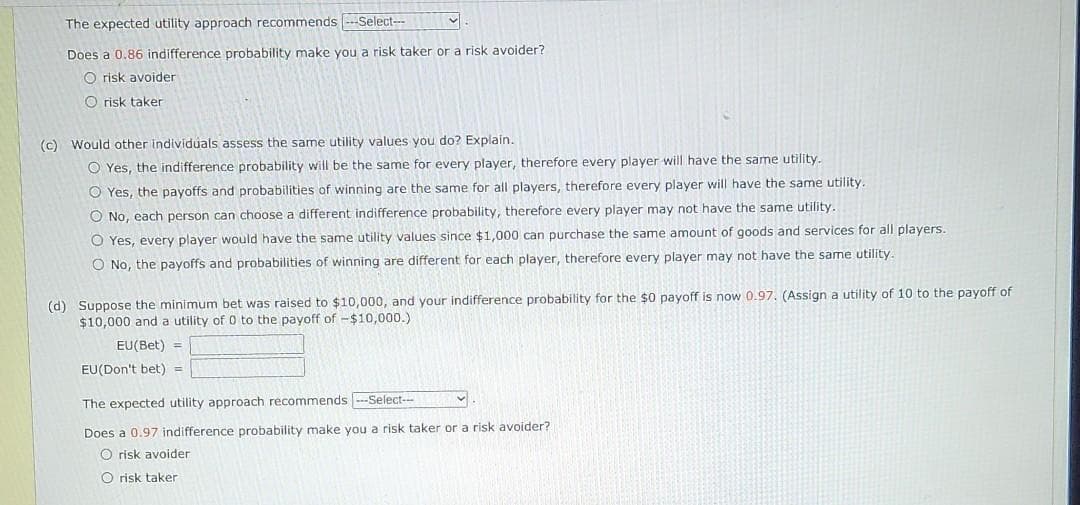Suppose that the point spread for a particular sporting event is 10 points and that with this spread you are convinced you would have a 0.66 probability of winning a bet on your team. However, the local bookie will accept only a $1,000 bet. Assuming that such bets are legal, would you bet on your team? (Disregard any commission charged by the bookie.) Remember that you must pay losses out of your own pocket. Your payoff table is as follows: State of Nature Decision Alternative You Win You Lose Bet $1,000 -$1,000 Don't bet (a) What decision does the expected value approach recommend? EV(Bet) = $ 320 EV(Don't bet) = $0 The expected value approach recommends placing the bet (b) Suppose you've chosen an indifference probability of 0.86 for the $0 payoff? What decision would you make based on the expected utility approach? (Assign a utility of 10 to the payoff of $1,000 and a utility of 0 to the payoff of -$1,000.) EU(Bet) = EU(Don't bet) = The expected utility approach recommends --Select--- a086 indiff prohability make vou risk avoider?
Suppose that the point spread for a particular sporting event is 10 points and that with this spread you are convinced you would have a 0.66 probability of winning a bet on your team. However, the local bookie will accept only a $1,000 bet. Assuming that such bets are legal, would you bet on your team? (Disregard any commission charged by the bookie.) Remember that you must pay losses out of your own pocket. Your payoff table is as follows: State of Nature Decision Alternative You Win You Lose Bet $1,000 -$1,000 Don't bet (a) What decision does the expected value approach recommend? EV(Bet) = $ 320 EV(Don't bet) = $0 The expected value approach recommends placing the bet (b) Suppose you've chosen an indifference probability of 0.86 for the $0 payoff? What decision would you make based on the expected utility approach? (Assign a utility of 10 to the payoff of $1,000 and a utility of 0 to the payoff of -$1,000.) EU(Bet) = EU(Don't bet) = The expected utility approach recommends --Select--- a086 indiff prohability make vou risk avoider?
Practical Management Science
6th Edition
ISBN:9781337406659
Author:WINSTON, Wayne L.
Publisher:WINSTON, Wayne L.
Chapter9: Decision Making Under Uncertainty
Section: Chapter Questions
Problem 69P
Related questions
Question

Transcribed Image Text:Suppose that the point spread for a particular sporting event is 10 points and that with this spread you are convinced you would have a 0.66 probability of
winning a bet on your team. However, the local bookie will accept only a $1,000 bet. Assuming that such bets are legal, would you bet on your team? (Disregard
any commission charged by the bookie.) Remember that you must pay losses out of your own pocket. Your payoff table is as follows:
State of Nature
Decision Alternative
You Win
You Lose
Bet
$1,000
-$1,000
Don't bet
(a) What decision does the expected value approach recommend?
EV(Bet) = $320
EV(Don't bet) = $0
The expected value approach recommends placing the bet
(b) Suppose you've chosen an indifference probability of 0.86 for the $0 payoff? What decision would you make based on the expected utility approach?
(Assign a utility of 10 to the payoff of $1,000 and a utility of 0 to the payoff of -$1,000.)
EU(Bèt) =
EU(Don't bet) =
The expected utility approach recommends ---Select--
Does a 0.86 indifference probability make you a risk taker or a risk avoider?
O risk avoider

Transcribed Image Text:The expected utility approach recommends Select--
Does a 0.86 indifference probability make you a risk taker or a risk avoider?
O risk avoider
O risk taker
(c) Would other individuals assess the same utility values you do? Explain.
O Yes, the indifference probability will be the same for every player, therefore every player will have the same utility.
O Yes, the payoffs and probabilities of winning are the same for all players, therefore every player will have the same utility.
O No, each person can choose a different indifference probability, therefore every player may not have the same utility.
O Yes, every player would have the same utility values since $1,000 can purchase the same amount of goods and services for all players.
O No, the payoffs and probabilities of winning are different for each player, therefore every player may not have the same utility.
(d) Suppose the minimum bet was raised to $10,000, and your indifference probability for the $0 payoff is now 0.97. (Assign a utility of 10 to the payoff of
$10,000 and a utility of 0 to the payoff of -$10,000.)
EU(Bet) =
EU(Don't bet) =
The expected utility approach recommends ---Select---
Does a 0.97 indifference probability make you a risk taker or a risk avoider?
O risk avoider
O risk taker
Expert Solution
This question has been solved!
Explore an expertly crafted, step-by-step solution for a thorough understanding of key concepts.
This is a popular solution!
Trending now
This is a popular solution!
Step by step
Solved in 2 steps with 21 images

Recommended textbooks for you

Practical Management Science
Operations Management
ISBN:
9781337406659
Author:
WINSTON, Wayne L.
Publisher:
Cengage,

Practical Management Science
Operations Management
ISBN:
9781337406659
Author:
WINSTON, Wayne L.
Publisher:
Cengage,